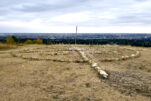Better places for federal money than Downie-Wenjack Fund
By Medicine Hat News Opinon on March 6, 2018.
Tragically Hip frontman Gord Downie? Awesome. Dedicating his final years on Earth towards reconciliation and addressing the legacy of Indian Residential Schools? Also awesome. The federal Liberals’ 2018 budget putting $5 million in funding towards Gord Downie and Chanie Wenjack Fund? Absolutely galling. Downie’s book, “The Secret Path,” tells the story of Chanie Wenjack who died while fleeing from residential school. It’s a story people need to hear. But it’s one of thousands. Where’s the extra money to help tell and preserve these other stories? With the funding announcement, there’s also been no mention on how exactly the $5 million will be spent and accounted for. What’s frustrating is, the announcement comes as smaller organizations — ones lead by survivors — are stuck on shoestring budgets, and often scraping to get by. Downie’s fund already has national fame and with it the ability to fundraise large amounts to put towards its goals of building reconciliation efforts across the country. Five million dollars could cover the costs of frontline workers dedicated to improving health care, education, mental health, providing programming for youth, or working in the criminal justice system to reduce the overrepresentation of aboriginal people. These could be the boots on the ground needed to implement recommendations put forward by the Truth and Reconciliation Commission. And yes, the federal budget did include $5 billion over three years for more “reconciliation” initiatives. But as NDP MP Romeo Saganash has pointed out, the investment of $600 million over three years in housing for 600 communities amounts to one house per community. That’s laughable. Saganash has also pointed out how the foundation set up by former Liberal Prime Minister Paul Martin is also receiving funds in the name of “reconciliation.” Backing localized, Indigenous-led programs is just common sense. Take, for example, how since 2014 the heart-wrenchingly high suicide rate in Nunavut has slowly edged downward. This has been attributed to the territory’s approach, which in part takes successful suicide prevention programs, which are then “Nunavutized” to be culturally specific. Those are the sort of programs that should get government funding. The Truth and Reconciliation Commission raised the importance of centering the voices of survivors. Of listening to them and putting them in the forefront. The “reconciliation” part of the federal budget simply doesn’t do that. (Peggy Revell is a News reporter. To comment on this and other editorials, go to https://www.medicinehatnews.com/opinions.) 16-15




